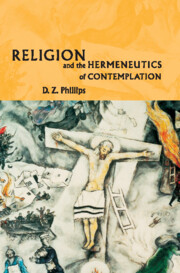Book contents
- Frontmatter
- Contents
- Preface and acknowledgements
- 1 Hermeneutics and the philosophical future of religious studies
- 2 Bernard Williams on the gods and us
- 3 Hume's legacy
- 4 Feuerbach: religion's secret?
- 5 Marx and Engels: religion, alienation and compensation
- 6 Tylor and Frazer: are religious beliefs mistaken hypotheses?
- 7 Marett: primitive reactions
- 8 Freud: the battle for ‘earliest’ things
- 9 Durkheim: religion as a social construct
- 10 Lévy-Bruhl: primitive logic
- 11 Berger: the avoidance of discourse
- 12 Winch: trying to understand
- 13 Understanding: a philosophical vocation
- Index of names
- Index of subjects
11 - Berger: the avoidance of discourse
Published online by Cambridge University Press: 03 December 2009
- Frontmatter
- Contents
- Preface and acknowledgements
- 1 Hermeneutics and the philosophical future of religious studies
- 2 Bernard Williams on the gods and us
- 3 Hume's legacy
- 4 Feuerbach: religion's secret?
- 5 Marx and Engels: religion, alienation and compensation
- 6 Tylor and Frazer: are religious beliefs mistaken hypotheses?
- 7 Marett: primitive reactions
- 8 Freud: the battle for ‘earliest’ things
- 9 Durkheim: religion as a social construct
- 10 Lévy-Bruhl: primitive logic
- 11 Berger: the avoidance of discourse
- 12 Winch: trying to understand
- 13 Understanding: a philosophical vocation
- Index of names
- Index of subjects
Summary
PLURALISM AND MARKETING RELIGION
As we saw in the last chapter, Lévy-Bruhl differs from the other writers we considered in that whereas they advance reductionist theses concerning religion, convinced that they understood the confusion which is its essence, he posed the question of whether we do understand religious belief. The reductionists, of necessity, reduce religion to some confused version of other forms of activity. In considering the work of the sociologist Peter Berger we come up against something we began to explore in what I called logical inversions in Durkheim's thought, namely, the possibility of confusion in the very language we are offered to think about religion. Further, as we shall see, this language may be such that, by its very nature, it erodes our sensibilities with respect to religion.
Having come thus far in an exploration of various theories which attempt to explain religion away, it will seem to be an extreme case of stating the obvious if we say that religion finds itself in a highly pluralistic culture. Yet, however obvious, the fact is worth stating, since the hermeneutics of contemplation is concerned with the question of what should be the philosophical reaction to that situation. It has to avoid a weakness often to be found in the hermeneutics of suspicion and the hermeneutics of recollection. Both pass each other like ships in the night because they do not choose worthy enough opponents. The point is not to deny that religion can be and always is, either occasionally or pervasively, what the hermeneutics of suspicion exposes and attacks. The point is to recognise that religion can be, and is, to varying extents, something else as well.
- Type
- Chapter
- Information
- Religion and the Hermeneutics of Contemplation , pp. 267 - 288Publisher: Cambridge University PressPrint publication year: 2001



